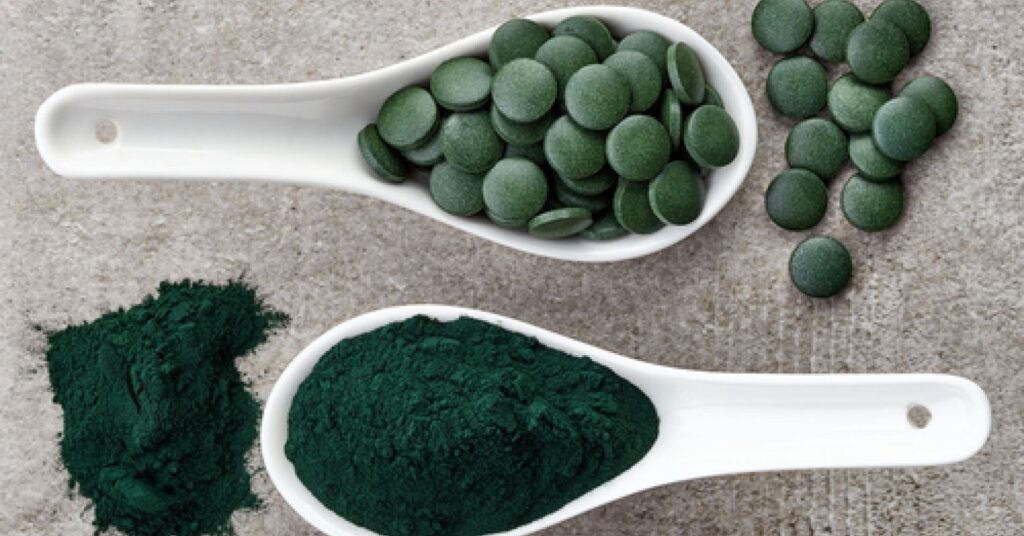
Home / Food & Nutrition / Algae: A Surprising Path to Complete Nutrition for Veggie Skeptics

Did you know that a significant portion of Americans fall short of consuming the recommended daily servings of vegetables? Factors such as the prevalence of fast food, large portion sizes, and a culture of processed foods have been associated with this trend.
More people are now focused on health and wellness, and the quest for improved nutrition is a constant pursuit. While vegetables have long been hailed as a cornerstone of a balanced diet, not everyone finds them appealing, especially kids! However, there’s a fascinating and unexpected solution that might just change the game: A-L-G-A-E. Yes, you heard it right! Those tiny organisms often associated with pond scum are emerging as a powerhouse of nutrition that can cater to even the most vegetable-averse individuals. It comes as a powder, in capsules, and even as an ingredient in some dishes! In this article, we’ll delve into the world of algae as a source of complete nutrition and explore how it could be the answer for those who have shied away from veggies.
For many people, vegetables can be a culinary challenge. Taste preferences, textures, and even cultural factors can contribute to a dislike or aversion to these nutrient-rich foods. While vegetables undoubtedly offer an array of vitamins, minerals, and fiber, there’s no one-size-fits-all approach to nutrition. This is where algae steps in, offering a unique alternative that might just bridge the nutritional gap for those who struggle with vegetables.
Algae might not sound glamorous, but these microscopic organisms are nutritional powerhouses. Spirulina and chlorella are two types of algae that have gained attention for their remarkable nutritional profiles. They contain a rich array of vitamins, including B vitamins and beta-carotene, as well as minerals like iron, magnesium, and calcium. Even more impressive is their protein content—algae can be a surprisingly potent source of plant-based protein, making it an appealing choice for vegetarians and vegans.
One of the main problems for people who shun veggies is the difficulty in getting enough protein. Complete proteins include all nine essential amino acids that the human body cannot generate. Surprisingly, algae perform well in this regard. It has a balanced amino acid composition that rivals the protein level of typical protein sources such as meat and dairy. So if you’re trying to maintain or gain muscle, algae could be a game-changer for you!
Another beneficial characteristic of algae is that they contain omega-3 fatty acids. Omega-3 fatty acids are critical for heart health, brain function, and inflammation reduction. Fish have long been hailed as a good source of these fatty acids, but algae can provide a direct plant-based alternative. This is especially appealing to vegetarians and vegans who wish to achieve their omega-3 requirements without relying on fish.
One of the standout features of this superfood is its versatility. It comes in various forms – powder, capsules, and even as an ingredient in certain foods! This means you can easily incorporate it into your daily routine without having to drastically change your eating habits. Mix spirulina powder into a smoothie, sprinkle chlorella capsules into your morning routine, or explore recipes that integrate algae into your meals.
Not only is it a nutritional powerhouse, but it also offers a sustainable alternative to traditional agriculture. Its cultivation requires fewer resources like water and land, making it an environmentally friendly option. As concerns about the environmental impact of food production grow, algae could emerge as a key player in the quest for sustainable nutrition.
For those who have been hesitant to embrace the world of vegetables, algae present an intriguing solution. Packed with vitamins, minerals, protein, and essential fatty acids, algae offer a complete nutritional package that can rival—and even surpass—the benefits of certain vegetables. Whether you’re a vegetarian seeking a complete protein source or someone looking to explore sustainable nutrition options, algae might just be the surprising answer you’ve been searching for. So, don’t let the small size fool you – algae could be your ticket to a healthier and more balanced diet!
Get free shipping.
Free Shipping
5% Discount


At home.
Blood and Urine
$179 – $439
Depending on insurance coverage.


This is a comprehensive stool test that relies on quantitative polymerase chain
reaction (qPCR) technology to detect parasites, bacteria, H. pylori, fungi, and more by targeting the specific DNA of the organisms tested. Click here for more information.
At home.
Stool
$399
Depending on insurance coverage.


At home.
Urine
$129
Depending on insurance coverage.


At home.
Swab
$299
Depending on insurance coverage.


At home or in lab.
Blood
$999
Depending on insurance coverage.


At home.
Blood, Urine, or Ticks
may have a $200 copay
Covered by most insurance.


At home.
Urine
$300
Depending on insurance coverage.


At home.
Urine
$199
Depending on insurance coverage.


This test evaluates the genetic profile for multiple health indicators. Click here for more information.
At home
Blood Spot


At Home
Urine
$699
Fully covered by Medicare. Repeat test prices $249


$85-$225 depending on insurance coverage.




This company can test for lyme, babesia, bartonella and additional tick-borne illnesses. Click here for more information.
Blood
around $1600 (depends on panel selected)


This test is designed to look at food sensitivities (IgG immune responses). It is available in both a 99 or 184 panel. Click here for more information.
Blood
$129-238


No insurance coverage


Blood




This test evaluates the gut function and indicates microbiome balance, overgrowth, infection, inflammation, parasites and digestive efficacy. Click here for more information.
$179-$439 depending on insurance coverage.


This test evaluates many measures including micronutrients, antioxidants, minerals, detox, overview of gut function, omegas and toxic exposure. Click here for more information.
At home.
Urine
$150 – $329


Blood work for blood count, urinalysis and vitamin levels.
At any Quest Diagnostics Location
Blood
You often have to fast for these tests-please check your providers notes.




$310